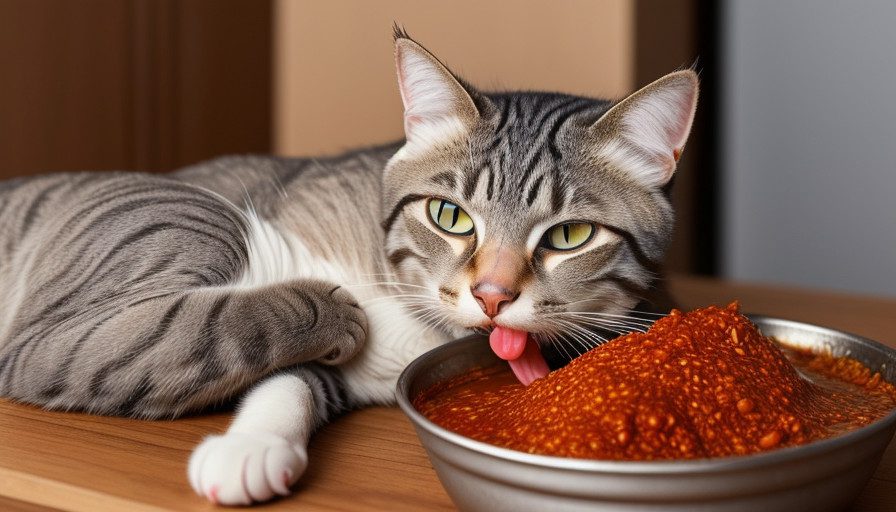Cats can taste spicy food but are less sensitive to it than humans. Their taste buds can detect flavours differently.
Table of Contents
Cats may enjoy spicy food less than humans, as their preference leans towards meat-based flavours. Despite being able to taste spiciness, cats’ taste receptors are tuned differently, and they may not show the same enthusiasm for it as humans.
Cat owners must be mindful of their pets’ preferences and provide a diet that aligns with their natural taste preferences and nutritional needs. Understanding how cats perceive flavours can help ensure their diet is enjoyable and suitable for their well-being.

The Science Behind Cat Taste Buds
Taste Bud Development
Cats are obligate carnivores, which means their diet is primarily meat-based. This preference is due to the development of their taste buds, which are different from humans. Cats have a limited number of taste buds compared to humans. While humans have around 9,000 taste buds, cats only have about 473, making their sense of taste less sensitive than that of humans.
Spicy Receptors In Cats
Unlike humans, cats lack the specific receptors to taste spicy foods. The reason behind this lies in their genetic makeup. Cats do not have the same sensitivity to capsaicin, the compound responsible for the heat in spicy foods, as humans do. This is due to a mutation in the gene that codes for the receptor that binds with capsaicin. As a result, cats do not experience the burning sensation that humans do when consuming spicy foods.
Can Cats Taste Spice?
Cats can taste spice to some extent, although their taste palette differs from that of humans.
Response To Capsaicin
Cats are less sensitive to the heat of chilli peppers due to a mutation in their TRPV1 receptor.
Preferential Taste Preferences
Cats may prefer meaty flavours over spicy ones, as they rely more on smell than taste.
The Impact Of Spicy Food On Cats
While humans enjoy the zing of spicy flavours, have you ever wondered if our feline friends experience the same sensation? As carnivores with different digestive systems, cats have unique tastes and sensitivities. Let’s explore how spicy food affects cats and the potential health risks it may pose.
Digestive System Sensitivity
Cats have a more sensitive digestive system than humans. They lack a specific taste receptor, known as the TRPV1 receptor, allowing them to experience the full range of spiciness humans do. Their taste buds are less receptive to such flavours, causing spicy foods to impact their tongues differently.
Cats do not react to capsaicin, the compound responsible for the burning sensation in spicy food, so they may not feel the heat in the same way humans do. However, they are still immune to the potential effects of spicy food.
Potential Health Risks
Feeding cats spicy food can have several detrimental effects on their health. Their sensitive digestive system can lead to stomach upset, vomiting, or diarrhea when exposed to spicy ingredients. These symptoms can disrupt their normal digestion and cause discomfort.
In addition to stomach issues, spicy foods can irritate a cat’s gastrointestinal tract, leading to inflammation or even more severe conditions such as gastritis or pancreatitis. These conditions may require veterinary intervention and can be dangerous if left untreated.
- Stomach upset
- Vomiting or diarrhoea
- Gastrointestinal inflammation
- Gastritis
- Pancreatitis
Moreover, spicy food often contains other ingredients that are harmful to cats, such as onions, garlic, or certain spices. These substances can be toxic to their system and may cause anaemia or damage their red blood cells.
Providing cats with a balanced diet is essential for their nutritional needs. Opting for cat-friendly treats and sticking to their regular cat food will help avoid any potential health risks associated with spicy food.


Cultural Variations In the Feline Diet
Like humans, cats are influenced by cultural factors regarding their dietary preferences. While it is commonly accepted that cats are obligate carnivores, meaning they thrive on a diet consisting mainly of meat, variations in feline diets can be observed across different cultures. In this article, we’ll explore the historical factors and regional dietary patterns contributing to the feline diet’s cultural variations.
Historical Factors
Understanding historical factors is crucial to comprehend the cultural variations in the feline diet. Over centuries, cats have been closely associated with human settlements, acting as natural rodent control agents. As cats’ roles evolved from mere hunters to companions, they adapted to the dietary practices of their communities.
The historical practice of farming and agriculture also impacted feline diets. For example, in ancient Egyptian culture, cats were considered sacred, and their diet often included fish, birds, and even sacrificial meat. In contrast, during the Middle Ages in Europe, cats were associated with witchcraft, leading to limited availability and diversity in their diets.
Regional Dietary Patterns
Humans’ regional dietary patterns heavily influence the type of food available for cats. Since cats have a keen sense of smell and taste, they may experience varying degrees of spiciness depending on their area.
For instance, in regions such as India or Mexico, where spicy food is a staple, cats may encounter bolder and hotter flavours compared to areas with milder culinary traditions. While cats possess taste receptors for bitterness and saltiness, their ability to taste spiciness is still debated among experts.
| Region | Dietary Pattern |
|---|---|
| Japan | Fish-focused diet |
| United States | Commercial cat food, poultry-based diet |
| North Africa | Lamb and poultry-based diet |
It is important to note that while cats generally prefer meat-based diets, individual preferences can still vary greatly. Genetics, early exposure to different flavours, and personal taste can all play a role in determining a cat’s dietary choices.
Ultimately, cultural variations in the feline diet highlight cats’ adaptability to different environments and human practices. Understanding these factors can help cat owners make informed choices about their pets’ diets, ensuring they receive the appropriate nutrition and flavour profiles based on their cultural contexts.
Understanding Feline Deterrents
Do you ever wonder why your curious feline friend steers clear of certain foods, particularly spicy ones? While humans may enjoy a kick of heat in our meals, cats have an instinctive aversion to spicy flavours. Understanding the feline deterrents can help pet owners make informed choices regarding their cat’s diet.
Natural Deterrents
As carnivores with a different taste profile than humans, cats are naturally deterred by certain flavours, including spiciness. Their taste buds are less developed than ours, and they need the receptors to allow them to appreciate the complexity of spicy foods. Cats often perceive what we perceive as spicy as bitter or unpleasant. This innate aversion to heat and spice keeps cats away from spicy foods.
Human-implemented Tactics
While cats possess natural deterrents to spicy foods, there are additional tactics that humans can implement to ensure their feline friends stay away from these flavours. Here are a few human-implemented tactics that can help:
- Keep spicy foods out of reach: Store your spicy snacks and meals in secure places where your cat cannot access them. This will help prevent any accidental ingestion that could lead to discomfort or digestive issues for your furry friend.
- Provide alternative options: Cats have their preferred flavours and textures. You can divert their attention away from spicy foods by offering them suitable and appealing alternatives, such as specially formulated cat treats or different flavours.
- Consult with your veterinarian: If you have concerns about your cat’s curiosity about spicy foods, it’s always a good idea to consult your veterinarian. They can provide guidance tailored to your cat’s specific needs and help you make informed decisions about their diet.
Understanding feline deterrents is crucial for cat owners to ensure the health and well-being of their pets. While cats may not enjoy the heat and spice of spicy foods, it’s always best to be proactive and take necessary precautions to prevent any potential issues.


Addressing Cat-safe Spices
Suitable Options
Cats can taste spicy food, but it’s essential to consider their safety when introducing spices. Some cat-safe spices include turmeric, parsley, and basil. These can add flavour to their meals without causing harm. Additionally, some cats can tolerate small amounts of cinnamon and ginger, but monitoring their reaction closely when introducing these spices is crucial.
Moderation And Approval
When incorporating spices, it’s vital to do so in moderation and with approval from a veterinarian. Cats have sensitive digestive systems, so introducing new flavours should be controlled and monitored. Always consult a professional before including spices in your cat’s diet to ensure their safety and well-being.
Alternatives To Spice For Feline Enrichment
When it comes to enriching the lives of our feline friends, it’s essential to ensure that their activities and treats are safe and enjoyable for them. One consideration when seeking alternatives to spice for feline enrichment is to provide activities and treats that cater to their natural behaviours and preferences.
Enrichment Activities
Engaging in enrichment activities can provide cats with mental and physical stimulation, helping to prevent boredom and promoting overall well-being. These activities can include interactive toys, puzzle feeders, and climbing structures to encourage natural behaviours such as hunting and exploring.
Appropriate Treats
Offering appropriate treats can also enrich our feline companions. These treats should be tailored to their dietary needs and preferences, such as freeze-dried meat or fish, catnip-infused toys, and feline-friendly grasses for nibbling. Providing these treats can offer a sensory experience and promote natural behaviours without the need for spicy ingredients.
Guidelines For Introducing New Flavors
Gradual Introduction Process
Ensure that new flavours are introduced slowly to prevent digestive issues.
- Start with a small amount of mild seasoning to gauge your cat’s reaction.
- Gradually increase the spiciness if your cat shows interest and has no adverse effects.
- Monitor closely for any signs of discomfort or allergic reactions.
Observation And Responsiveness
Always be attentive to your cat’s response when trying new flavours.
- Observe your cat’s appetite, behaviour, and overall well-being.
- Respond promptly to any changes in eating habits or health.
- Consult a vet if your cat shows persistent aversion or symptoms of discomfort.
Frequently Asked Questions For Can Cats Taste Spicy Food
What Happens If A Cat Licks Spicy Food?
If a cat licks spicy food, it may experience gastrointestinal upset, such as vomiting or diarrhoea. Cats dislike spicy flavours.
What Does Spicy Food Taste Like To Cats?
Spicy food tastes intense and unpleasant to cats due to their lack of taste receptors for heat. They may experience discomfort and irritation in their mouths and digestive systems. It’s best to avoid giving spicy food to cats, as it can cause distress and potential health issues.
What Happens If A Cat Eats A Jalapeno?
If a cat eats a jalapeno, it may experience gastrointestinal distress, such as vomiting or diarrhoea. It’s best to monitor the cat for symptoms and consult a veterinarian immediately if any issues arise. Avoid giving spicy foods to cats to prevent potential health problems.
What Flavors Can Cats Taste?
Cats can taste salty, sour, bitter, and sweet flavours, but their taste buds are not as developed as those of humans.
Can Cats Taste Spicy Food?
Cats have taste buds that detect bitter, sour, and savoury flavours but cannot taste spicy foods like humans.
Conclusion
While cats can’t taste spiciness like humans, they can still enjoy certain flavours. Understanding their preferences helps in providing a balanced diet. Offering a variety of foods enriches their palate and overall well-being. Respect your feline friend’s taste buds for a harmonious dining experience.
Embrace their unique culinary preferences.

Pingback: Why is My Cat Throwing Up Undigested Food: Uncover the Causes and Solutions - Comprehensive Guide to Pet Care
Pingback: Do Munchkin Cats Suffer Health Issues? Find Out Now! - Comprehensive Guide to Pet Care